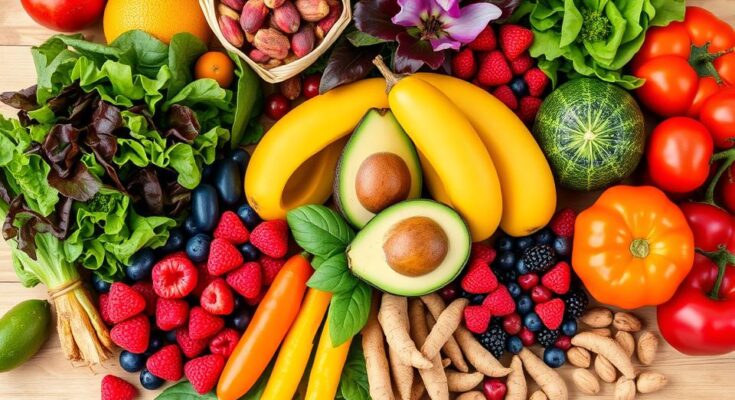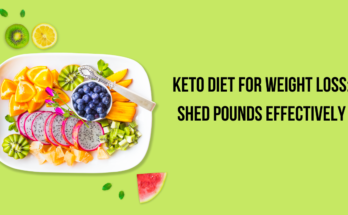Inflammation is how our body fights off harm. But too much can cause health problems. Eating the right foods can help fight this and keep us healthy.

Eating foods full of good stuff is key. These foods fight bad stress, help our gut, and keep our immune system strong. But, foods that are bad for us can make inflammation worse.
Knowing what to eat can help you stay healthy. We’ll talk about foods that fight inflammation and how to eat them. We’ll also share tips for living a healthier life.
Key Takeaways
- Chronic inflammation is linked to various health conditions and can be managed through diet
- Anti-inflammatory foods include fruits, vegetables, whole grains, healthy fats, and herbs and spices
- Processed foods, sugar, and unhealthy fats can exacerbate inflammation and should be limited
- Omega-3 fatty acids and a plant-based diet have potent anti-inflammatory properties
- Lifestyle factors such as stress management, exercise, and quality sleep also play a role in reducing inflammation
Understanding Inflammation and Its Impact on Health
Inflammation is how our body fights off harm. It’s like a shield against infections and injuries. But, too much of it can harm our health. Let’s learn more about inflammation and how it affects us.
What is Inflammation?
Inflammation is a way our body heals itself. It happens when our immune system finds a threat. This leads to redness, swelling, and pain in the affected area.
Acute vs. Chronic Inflammation
Inflammation can be short-term or long-term. Short-term inflammation helps us heal quickly. It’s like when you get a cut or a sprained ankle.
Long-term inflammation lasts for months or years. It happens when our immune system stays on high alert. This can be caused by unhealthy eating, being overweight, or smoking. It can lead to many health problems.
Health Conditions Linked to Chronic Inflammation
Chronic inflammation is linked to many health issues. Here are a few:
- Heart disease: It can damage blood vessels and increase the risk of heart attacks and strokes.
- Diabetes: It can make it hard for insulin to work, raising the risk of type 2 diabetes.
- Arthritis: It can cause pain and damage to joints, leading to conditions like rheumatoid arthritis.
- Cancer: It can help cancer cells grow and spread.
- Autoimmune disorders: It can make the immune system attack the body’s own tissues, leading to diseases like lupus.
Chronic inflammation is like a slow-burning fire that damages our body over time. Understanding its role helps us fight it and stay healthy.
Knowing how chronic inflammation affects us helps us make better choices. We can eat better and live healthier to reduce inflammation. Next, we’ll talk about how diet can help fight chronic inflammation.
The Role of Diet in Reducing Inflammation
Diet is very important for managing inflammation in our bodies. By choosing the right foods, we can help or stop inflammation. An anti-inflammatory diet includes whole foods and avoids processed ones that can cause inflammation.
Omega-3 fatty acids in fatty fish and seeds like flax and chia are good for us. They help fight inflammation and keep our body balanced.
Fruits and veggies full of antioxidants are also key. Berries, leafy greens, and colorful peppers are great. They have vitamins and minerals that fight stress and inflammation.
“Let food be thy medicine and medicine be thy food.” – Hippocrates
Foods high in fiber, like whole grains and veggies, are important too. Fiber helps good bacteria in our gut, which fights inflammation. Eating a lot of plant-based foods can lower inflammation markers.
By eating foods rich in omega-3s, antioxidants, and fiber, we can fight inflammation. This helps us stay healthy and feel good.
Anti-Inflammatory Foods to Incorporate into Your Diet
To fight inflammation, eat foods that are good for you. Look for foods full of antioxidants, fiber, and healthy fats. These help fight inflammation and keep you healthy.
Fruits and Vegetables
Fruits and veggies are key to an anti-inflammatory diet. They have antioxidants that fight off bad stuff. Berries, spinach, and kale are great for this.
They also have fiber, which is good for your gut. This helps lower inflammation too.
Whole Grains
Whole grains like brown rice and quinoa are full of fiber. They give you energy slowly and make you feel full. This helps keep your blood sugar steady and fights inflammation.
Healthy Fats
Healthy fats, like omega-3s, are very good at fighting inflammation. You can find them in fish and nuts like walnuts. Eating these fats helps your brain and heart too.
Spices and Herbs
Some spices and herbs are great for fighting inflammation. Turmeric and ginger are two examples. They add flavor and help your body feel better.
By eating lots of fruits, veggies, whole grains, healthy fats, and spices, you can lower inflammation. This makes you healthier and happier.
Foods to Avoid for Reducing Inflammation
It’s key to eat foods that fight inflammation. But, we also need to avoid foods that cause it. These foods have bad carbs, sugars, and fats. They can make us sick and hurt our health.
By choosing the right foods, we help our bodies heal. This can lower the chance of getting sick often.
Processed and Refined Foods
Processed foods are bad for us. They have unhealthy fats, sugars, and fake stuff. These foods mess with our good gut bacteria and make us sick.
They also lack the good stuff we need. Eating whole foods like fruits and veggies is better. They help keep us healthy and fight inflammation.
Sugar and High-Fructose Corn Syrup
Too much sugar and corn syrup is bad. They can make us fat and sick. They’re in sweet drinks and many foods.
They make our blood sugar go up too fast. This can make us sick and hurt our body. Try to eat less of these and choose natural sweeteners instead.

Trans Fats and Partially Hydrogenated Oils
Trans fats are bad for us. They’re in fried foods and snacks. They’re made to last longer but are unhealthy.
They can make us sick and hurt our heart. Try to avoid foods with trans fats. Look for foods that say zero grams of trans fats.
By reducing your consumption of processed and refined foods, added sugars, and unhealthy fats, you can take a significant step towards lowering inflammation in your body and promoting overall health and well-being.
Omega-3 Fatty Acids and Their Anti-Inflammatory Properties
Omega-3 fatty acids are key in fighting inflammation through diet. EPA and DHA are especially important. Eating foods rich in omega-3s helps fight chronic inflammation and boosts health.
Fatty fish like salmon, mackerel, and sardines are great sources. They have lots of EPA and DHA. Eating fatty fish two times a week can help a lot.
If you don’t eat meat, flaxseed, chia seeds, and walnuts are good alternatives. They have ALA, which turns into EPA and DHA in the body. Adding flaxseed to smoothies or chia seeds to salads can increase your omega-3 intake.
Studies have shown that regular consumption of omega-3 fatty acids can help reduce the risk of chronic diseases associated with inflammation, such as heart disease, arthritis, and certain types of cancer.
Omega-3s also help the brain, mood, skin, and hair. Eating foods rich in EPA and DHA can reduce inflammation and improve overall health.
The Benefits of a Plant-Based Diet for Reducing Inflammation
Eating a plant-based diet can help lower body inflammation. Focus on foods like fruits, veggies, whole grains, and legumes. These foods are full of nutrients that fight inflammation.

Plant-based diets are full of antioxidants. These fight off harmful free radicals. Free radicals can damage cells and cause inflammation. Eating lots of colorful fruits and veggies gives you lots of antioxidants.
Increased Antioxidant Intake
Fruits and veggies are key in a plant-based diet. They have vitamins, minerals, and phytochemicals. These are powerful antioxidants.
- Berries: Blueberries, raspberries, and strawberries have anthocyanins and flavonoids. They fight oxidative stress.
- Leafy greens: Spinach, kale, and collard greens have vitamins A, C, and E. They also have carotenoids like beta-carotene and lutein.
- Citrus fruits: Oranges, grapefruits, and lemons are full of vitamin C. Vitamin C is a strong antioxidant that boosts the immune system and lowers inflammation.
Improved Gut Health
Plant-based diets are good for your gut. They have lots of fiber. Fiber feeds the good bacteria in your gut.
These good bacteria make short-chain fatty acids. These acids help keep your gut lining healthy. They also lower inflammation in your digestive system.
Plant-based diets also have fermented foods like tempeh, sauerkraut, and kimchi. These foods are full of probiotics. Probiotics help keep your gut microbiome balanced. They support your immune system and lower inflammation.
“A plant-based diet is a powerful tool for reducing inflammation and promoting overall health. By embracing a variety of whole, unprocessed plant foods, you can harness the anti-inflammatory properties of antioxidants and support a thriving gut microbiome.”
Starting a plant-based diet might seem hard at first. But with a little creativity and planning, you can make delicious meals. These meals will help your body fight inflammation.
Reduce Inflammation Through Diet: A Comprehensive Approach
To fight inflammation with food, you need a big plan. It’s not just about eating foods that help. You also need to eat the right amount and keep your diet balanced. This way, you can control inflammation and stay healthy.
It’s important to control how much you eat. Even healthy foods can be bad if you eat too much. Being careful with your portions helps you avoid too many calories and keeps your weight healthy.
Planning your meals is also key. It helps you eat more foods that fight inflammation and less that causes it. Planning meals stops you from making bad food choices and keeps you on track with your diet.
The key to success with an anti-inflammatory diet is to make it a sustainable lifestyle change rather than a temporary fix.
When you plan your meals, think about eating a variety of foods. Include colorful fruits and veggies, whole grains, healthy fats, and lean proteins. Don’t forget to add spices like turmeric, ginger, and garlic for extra flavor and health benefits.
By using a big plan to fight inflammation with food, you can manage it well. This includes eating the right amount, keeping your diet balanced, and planning your meals. Remember, small changes in how you eat can make a big difference over time.
Lifestyle Factors That Contribute to Inflammation
Diet is key in fighting inflammation. But, other lifestyle choices matter too. Stress, exercise, and sleep are important. Together with a good diet, they help reduce inflammation and improve health.
Stress Management
Too much stress can make inflammation worse. It raises cortisol levels. Try meditation, deep breathing, or yoga to calm down.
Doing things you love also helps. It’s a great way to fight stress and inflammation.
Regular Exercise
Exercise is a strong ally against inflammation. Activities like walking, swimming, or cycling are good. Try to do 30 minutes of moderate exercise daily.
Choose activities you enjoy. This makes exercise a fun part of your life.
Quality Sleep
Good sleep is vital for fighting inflammation. Bad sleep can make inflammation worse. Aim for 7-9 hours of sleep each night.
Stick to a sleep schedule and make bedtime relaxing. A comfy sleep space is also important. Better sleep helps control inflammation and boosts health.
FAQ
What is the role of diet in reducing inflammation?
Diet is very important in fighting inflammation. Some foods can make it worse, while others help. Eating foods rich in nutrients and avoiding processed foods is key.
What are some anti-inflammatory foods I should incorporate into my diet?
Include fruits, veggies, whole grains, and healthy fats in your diet. Foods like fatty fish, nuts, and seeds are good. Also, add spices like turmeric and ginger for their anti-inflammatory benefits.
Are there any foods I should avoid to reduce inflammation?
Yes, stay away from processed and refined foods. These include packaged snacks and fast food. They have unhealthy fats and added sugars that can cause inflammation. Limit sugar, high-fructose corn syrup, and trans fats too.
How do omega-3 fatty acids help reduce inflammation?
Omega-3s, especially EPA and DHA, fight inflammation well. You can find them in fatty fish like salmon. Flaxseed, chia seeds, and walnuts are good plant-based sources.
Can a plant-based diet help reduce inflammation?
Yes, a plant-based diet is great for reducing inflammation. It’s full of antioxidants and fiber from fruits, veggies, and whole grains. This diet supports gut health and fights free radicals.
Besides diet, what lifestyle factors contribute to inflammation?
Stress, exercise, and sleep also affect inflammation. Managing stress, staying active, and getting enough sleep are important. They help keep inflammation in check.
How can I ensure I’m following a comprehensive approach to reduce inflammation through diet?
To fight inflammation through diet, eat a variety of anti-inflammatory foods. Avoid foods that cause inflammation. Use portion control and plan your meals to get all the nutrients you need.




